Comparative Business Ethics and Social Responsibility Essay T1 2019
VerifiedAdded on 2022/11/25
|7
|1773
|500
Essay
AI Summary
This essay delves into the core concepts of business ethics and social responsibility, emphasizing the distinction between personal and organizational ethics. It examines the roles of stakeholders, corporate governance, and social responsibility within a business context. The essay uses the Commonwealth Bank (CBA) financial scandal as a real-world case study to illustrate unethical behaviors, including individual misconduct, incentive-driven issues, and cover-ups. It applies ethical frameworks, specifically utilitarianism and Kantian theory, to analyze the CBA case, evaluating the consequences and intentions behind the actions. The analysis highlights how the actions of CBA, viewed through these ethical lenses, failed to promote the greater good or adhere to universal moral principles. The essay concludes by reiterating the importance of ethical conduct for sustainable business practices and social responsibility.
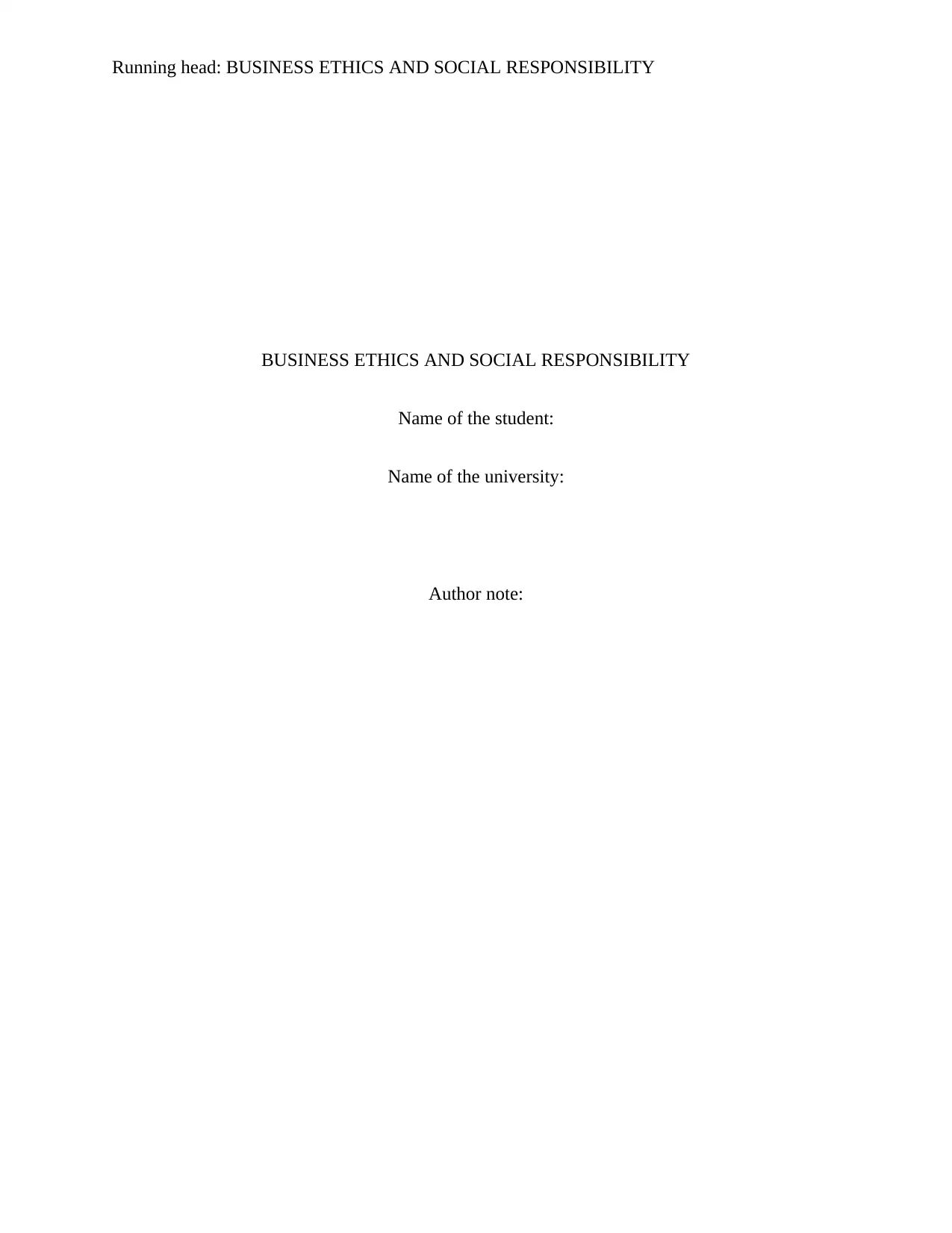
Running head: BUSINESS ETHICS AND SOCIAL RESPONSIBILITY
BUSINESS ETHICS AND SOCIAL RESPONSIBILITY
Name of the student:
Name of the university:
Author note:
BUSINESS ETHICS AND SOCIAL RESPONSIBILITY
Name of the student:
Name of the university:
Author note:
Paraphrase This Document
Need a fresh take? Get an instant paraphrase of this document with our AI Paraphraser
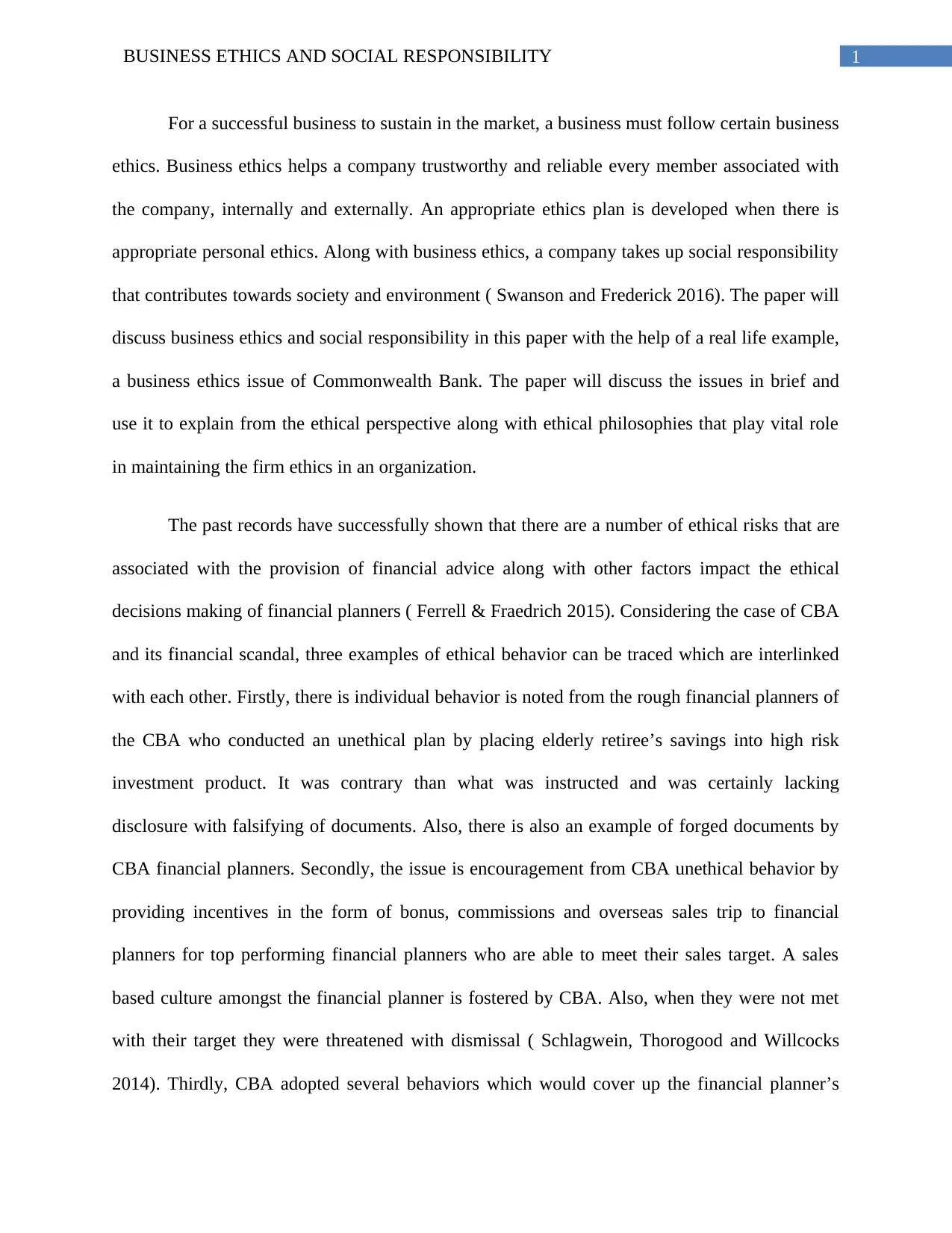
1BUSINESS ETHICS AND SOCIAL RESPONSIBILITY
For a successful business to sustain in the market, a business must follow certain business
ethics. Business ethics helps a company trustworthy and reliable every member associated with
the company, internally and externally. An appropriate ethics plan is developed when there is
appropriate personal ethics. Along with business ethics, a company takes up social responsibility
that contributes towards society and environment ( Swanson and Frederick 2016). The paper will
discuss business ethics and social responsibility in this paper with the help of a real life example,
a business ethics issue of Commonwealth Bank. The paper will discuss the issues in brief and
use it to explain from the ethical perspective along with ethical philosophies that play vital role
in maintaining the firm ethics in an organization.
The past records have successfully shown that there are a number of ethical risks that are
associated with the provision of financial advice along with other factors impact the ethical
decisions making of financial planners ( Ferrell & Fraedrich 2015). Considering the case of CBA
and its financial scandal, three examples of ethical behavior can be traced which are interlinked
with each other. Firstly, there is individual behavior is noted from the rough financial planners of
the CBA who conducted an unethical plan by placing elderly retiree’s savings into high risk
investment product. It was contrary than what was instructed and was certainly lacking
disclosure with falsifying of documents. Also, there is also an example of forged documents by
CBA financial planners. Secondly, the issue is encouragement from CBA unethical behavior by
providing incentives in the form of bonus, commissions and overseas sales trip to financial
planners for top performing financial planners who are able to meet their sales target. A sales
based culture amongst the financial planner is fostered by CBA. Also, when they were not met
with their target they were threatened with dismissal ( Schlagwein, Thorogood and Willcocks
2014). Thirdly, CBA adopted several behaviors which would cover up the financial planner’s
For a successful business to sustain in the market, a business must follow certain business
ethics. Business ethics helps a company trustworthy and reliable every member associated with
the company, internally and externally. An appropriate ethics plan is developed when there is
appropriate personal ethics. Along with business ethics, a company takes up social responsibility
that contributes towards society and environment ( Swanson and Frederick 2016). The paper will
discuss business ethics and social responsibility in this paper with the help of a real life example,
a business ethics issue of Commonwealth Bank. The paper will discuss the issues in brief and
use it to explain from the ethical perspective along with ethical philosophies that play vital role
in maintaining the firm ethics in an organization.
The past records have successfully shown that there are a number of ethical risks that are
associated with the provision of financial advice along with other factors impact the ethical
decisions making of financial planners ( Ferrell & Fraedrich 2015). Considering the case of CBA
and its financial scandal, three examples of ethical behavior can be traced which are interlinked
with each other. Firstly, there is individual behavior is noted from the rough financial planners of
the CBA who conducted an unethical plan by placing elderly retiree’s savings into high risk
investment product. It was contrary than what was instructed and was certainly lacking
disclosure with falsifying of documents. Also, there is also an example of forged documents by
CBA financial planners. Secondly, the issue is encouragement from CBA unethical behavior by
providing incentives in the form of bonus, commissions and overseas sales trip to financial
planners for top performing financial planners who are able to meet their sales target. A sales
based culture amongst the financial planner is fostered by CBA. Also, when they were not met
with their target they were threatened with dismissal ( Schlagwein, Thorogood and Willcocks
2014). Thirdly, CBA adopted several behaviors which would cover up the financial planner’s
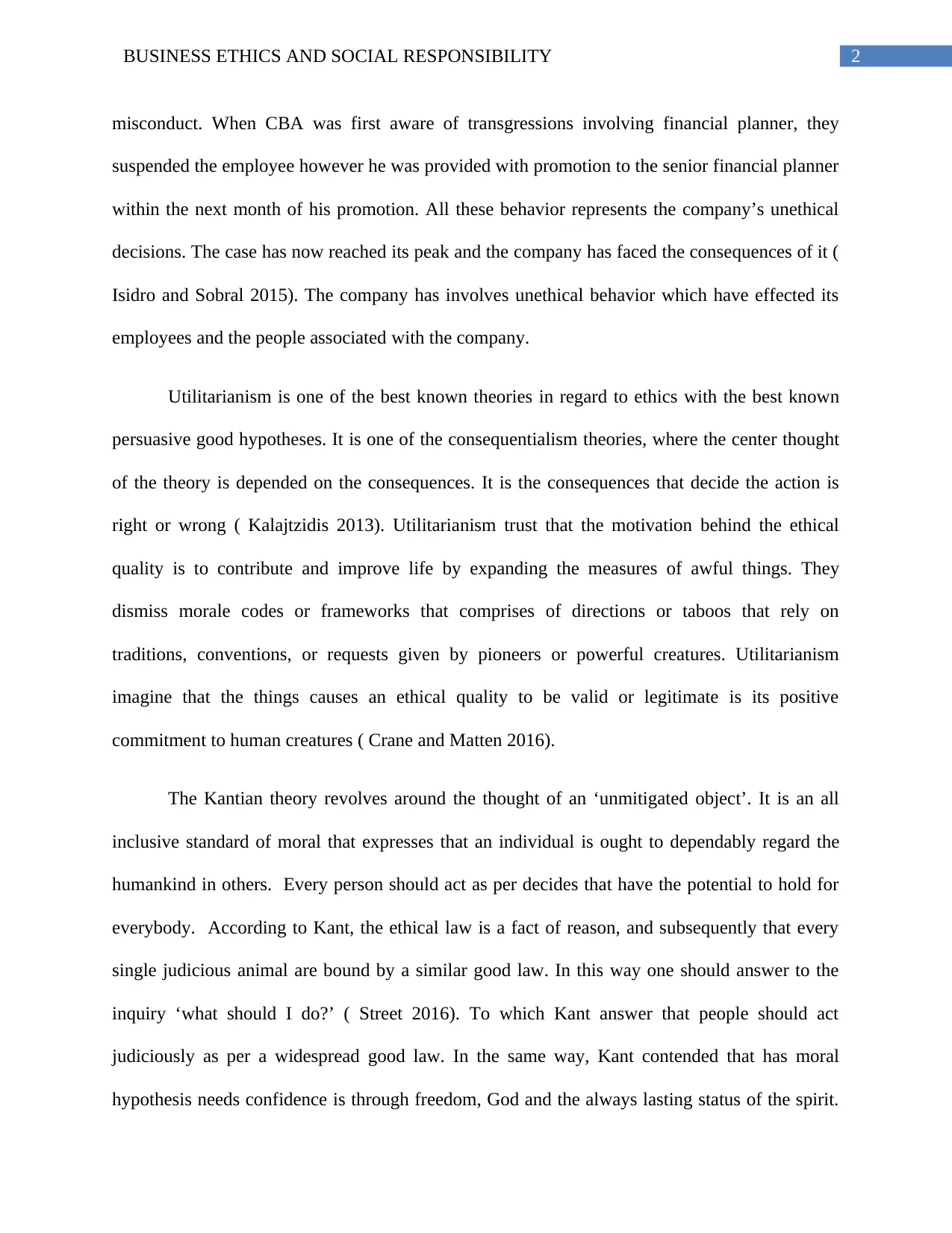
2BUSINESS ETHICS AND SOCIAL RESPONSIBILITY
misconduct. When CBA was first aware of transgressions involving financial planner, they
suspended the employee however he was provided with promotion to the senior financial planner
within the next month of his promotion. All these behavior represents the company’s unethical
decisions. The case has now reached its peak and the company has faced the consequences of it (
Isidro and Sobral 2015). The company has involves unethical behavior which have effected its
employees and the people associated with the company.
Utilitarianism is one of the best known theories in regard to ethics with the best known
persuasive good hypotheses. It is one of the consequentialism theories, where the center thought
of the theory is depended on the consequences. It is the consequences that decide the action is
right or wrong ( Kalajtzidis 2013). Utilitarianism trust that the motivation behind the ethical
quality is to contribute and improve life by expanding the measures of awful things. They
dismiss morale codes or frameworks that comprises of directions or taboos that rely on
traditions, conventions, or requests given by pioneers or powerful creatures. Utilitarianism
imagine that the things causes an ethical quality to be valid or legitimate is its positive
commitment to human creatures ( Crane and Matten 2016).
The Kantian theory revolves around the thought of an ‘unmitigated object’. It is an all
inclusive standard of moral that expresses that an individual is ought to dependably regard the
humankind in others. Every person should act as per decides that have the potential to hold for
everybody. According to Kant, the ethical law is a fact of reason, and subsequently that every
single judicious animal are bound by a similar good law. In this way one should answer to the
inquiry ‘what should I do?’ ( Street 2016). To which Kant answer that people should act
judiciously as per a widespread good law. In the same way, Kant contended that has moral
hypothesis needs confidence is through freedom, God and the always lasting status of the spirit.
misconduct. When CBA was first aware of transgressions involving financial planner, they
suspended the employee however he was provided with promotion to the senior financial planner
within the next month of his promotion. All these behavior represents the company’s unethical
decisions. The case has now reached its peak and the company has faced the consequences of it (
Isidro and Sobral 2015). The company has involves unethical behavior which have effected its
employees and the people associated with the company.
Utilitarianism is one of the best known theories in regard to ethics with the best known
persuasive good hypotheses. It is one of the consequentialism theories, where the center thought
of the theory is depended on the consequences. It is the consequences that decide the action is
right or wrong ( Kalajtzidis 2013). Utilitarianism trust that the motivation behind the ethical
quality is to contribute and improve life by expanding the measures of awful things. They
dismiss morale codes or frameworks that comprises of directions or taboos that rely on
traditions, conventions, or requests given by pioneers or powerful creatures. Utilitarianism
imagine that the things causes an ethical quality to be valid or legitimate is its positive
commitment to human creatures ( Crane and Matten 2016).
The Kantian theory revolves around the thought of an ‘unmitigated object’. It is an all
inclusive standard of moral that expresses that an individual is ought to dependably regard the
humankind in others. Every person should act as per decides that have the potential to hold for
everybody. According to Kant, the ethical law is a fact of reason, and subsequently that every
single judicious animal are bound by a similar good law. In this way one should answer to the
inquiry ‘what should I do?’ ( Street 2016). To which Kant answer that people should act
judiciously as per a widespread good law. In the same way, Kant contended that has moral
hypothesis needs confidence is through freedom, God and the always lasting status of the spirit.
⊘ This is a preview!⊘
Do you want full access?
Subscribe today to unlock all pages.

Trusted by 1+ million students worldwide
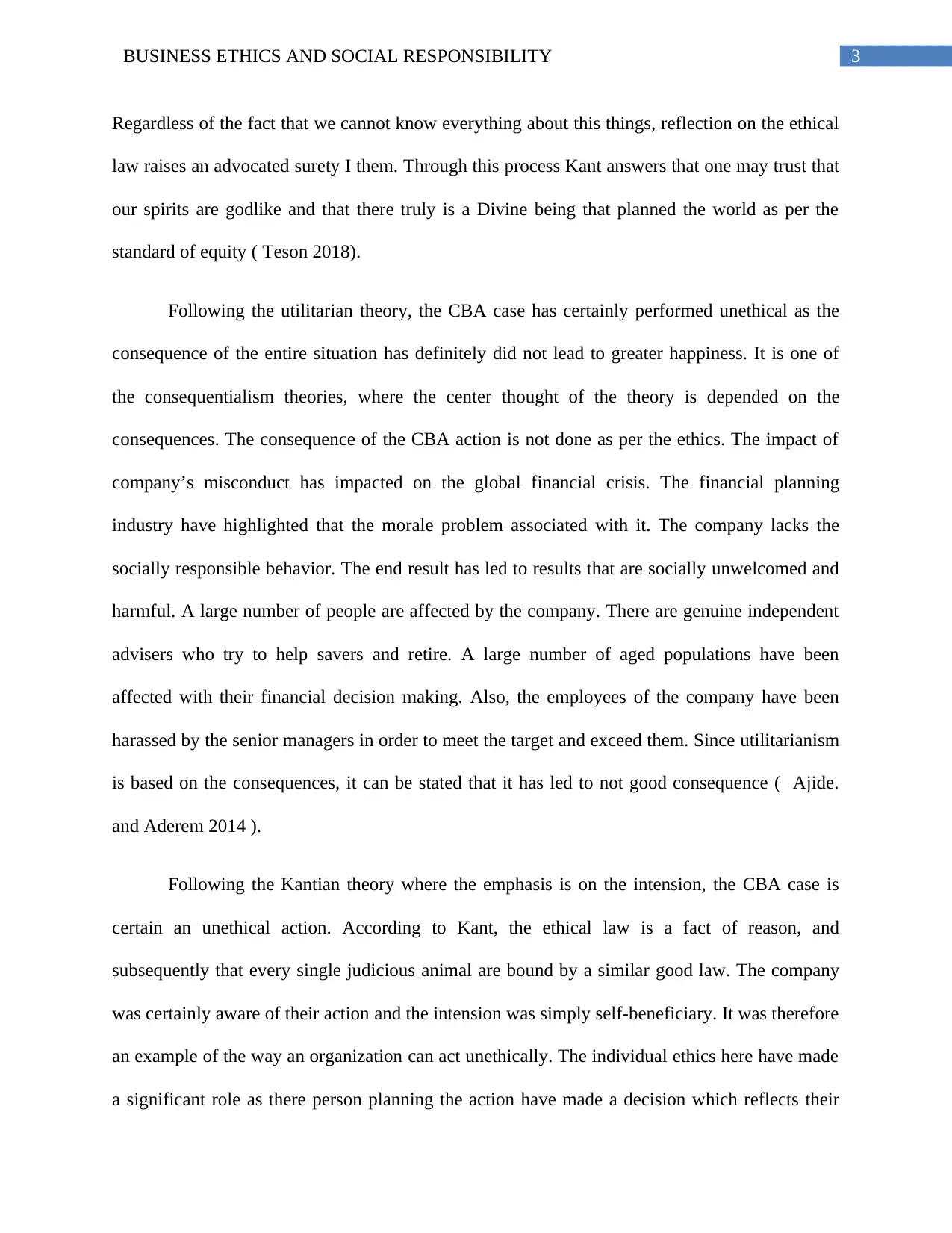
3BUSINESS ETHICS AND SOCIAL RESPONSIBILITY
Regardless of the fact that we cannot know everything about this things, reflection on the ethical
law raises an advocated surety I them. Through this process Kant answers that one may trust that
our spirits are godlike and that there truly is a Divine being that planned the world as per the
standard of equity ( Teson 2018).
Following the utilitarian theory, the CBA case has certainly performed unethical as the
consequence of the entire situation has definitely did not lead to greater happiness. It is one of
the consequentialism theories, where the center thought of the theory is depended on the
consequences. The consequence of the CBA action is not done as per the ethics. The impact of
company’s misconduct has impacted on the global financial crisis. The financial planning
industry have highlighted that the morale problem associated with it. The company lacks the
socially responsible behavior. The end result has led to results that are socially unwelcomed and
harmful. A large number of people are affected by the company. There are genuine independent
advisers who try to help savers and retire. A large number of aged populations have been
affected with their financial decision making. Also, the employees of the company have been
harassed by the senior managers in order to meet the target and exceed them. Since utilitarianism
is based on the consequences, it can be stated that it has led to not good consequence ( Ajide.
and Aderem 2014 ).
Following the Kantian theory where the emphasis is on the intension, the CBA case is
certain an unethical action. According to Kant, the ethical law is a fact of reason, and
subsequently that every single judicious animal are bound by a similar good law. The company
was certainly aware of their action and the intension was simply self-beneficiary. It was therefore
an example of the way an organization can act unethically. The individual ethics here have made
a significant role as there person planning the action have made a decision which reflects their
Regardless of the fact that we cannot know everything about this things, reflection on the ethical
law raises an advocated surety I them. Through this process Kant answers that one may trust that
our spirits are godlike and that there truly is a Divine being that planned the world as per the
standard of equity ( Teson 2018).
Following the utilitarian theory, the CBA case has certainly performed unethical as the
consequence of the entire situation has definitely did not lead to greater happiness. It is one of
the consequentialism theories, where the center thought of the theory is depended on the
consequences. The consequence of the CBA action is not done as per the ethics. The impact of
company’s misconduct has impacted on the global financial crisis. The financial planning
industry have highlighted that the morale problem associated with it. The company lacks the
socially responsible behavior. The end result has led to results that are socially unwelcomed and
harmful. A large number of people are affected by the company. There are genuine independent
advisers who try to help savers and retire. A large number of aged populations have been
affected with their financial decision making. Also, the employees of the company have been
harassed by the senior managers in order to meet the target and exceed them. Since utilitarianism
is based on the consequences, it can be stated that it has led to not good consequence ( Ajide.
and Aderem 2014 ).
Following the Kantian theory where the emphasis is on the intension, the CBA case is
certain an unethical action. According to Kant, the ethical law is a fact of reason, and
subsequently that every single judicious animal are bound by a similar good law. The company
was certainly aware of their action and the intension was simply self-beneficiary. It was therefore
an example of the way an organization can act unethically. The individual ethics here have made
a significant role as there person planning the action have made a decision which reflects their
Paraphrase This Document
Need a fresh take? Get an instant paraphrase of this document with our AI Paraphraser
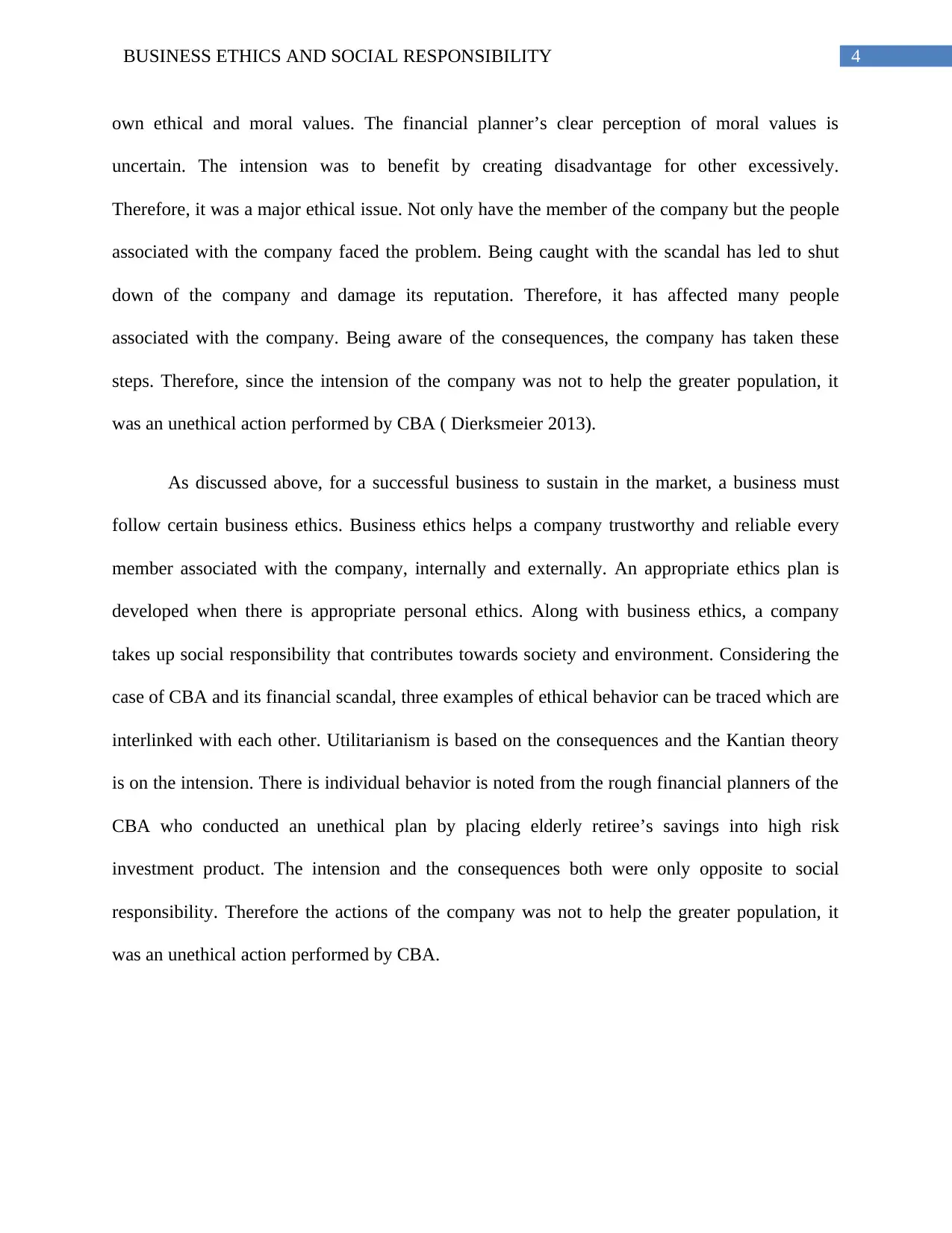
4BUSINESS ETHICS AND SOCIAL RESPONSIBILITY
own ethical and moral values. The financial planner’s clear perception of moral values is
uncertain. The intension was to benefit by creating disadvantage for other excessively.
Therefore, it was a major ethical issue. Not only have the member of the company but the people
associated with the company faced the problem. Being caught with the scandal has led to shut
down of the company and damage its reputation. Therefore, it has affected many people
associated with the company. Being aware of the consequences, the company has taken these
steps. Therefore, since the intension of the company was not to help the greater population, it
was an unethical action performed by CBA ( Dierksmeier 2013).
As discussed above, for a successful business to sustain in the market, a business must
follow certain business ethics. Business ethics helps a company trustworthy and reliable every
member associated with the company, internally and externally. An appropriate ethics plan is
developed when there is appropriate personal ethics. Along with business ethics, a company
takes up social responsibility that contributes towards society and environment. Considering the
case of CBA and its financial scandal, three examples of ethical behavior can be traced which are
interlinked with each other. Utilitarianism is based on the consequences and the Kantian theory
is on the intension. There is individual behavior is noted from the rough financial planners of the
CBA who conducted an unethical plan by placing elderly retiree’s savings into high risk
investment product. The intension and the consequences both were only opposite to social
responsibility. Therefore the actions of the company was not to help the greater population, it
was an unethical action performed by CBA.
own ethical and moral values. The financial planner’s clear perception of moral values is
uncertain. The intension was to benefit by creating disadvantage for other excessively.
Therefore, it was a major ethical issue. Not only have the member of the company but the people
associated with the company faced the problem. Being caught with the scandal has led to shut
down of the company and damage its reputation. Therefore, it has affected many people
associated with the company. Being aware of the consequences, the company has taken these
steps. Therefore, since the intension of the company was not to help the greater population, it
was an unethical action performed by CBA ( Dierksmeier 2013).
As discussed above, for a successful business to sustain in the market, a business must
follow certain business ethics. Business ethics helps a company trustworthy and reliable every
member associated with the company, internally and externally. An appropriate ethics plan is
developed when there is appropriate personal ethics. Along with business ethics, a company
takes up social responsibility that contributes towards society and environment. Considering the
case of CBA and its financial scandal, three examples of ethical behavior can be traced which are
interlinked with each other. Utilitarianism is based on the consequences and the Kantian theory
is on the intension. There is individual behavior is noted from the rough financial planners of the
CBA who conducted an unethical plan by placing elderly retiree’s savings into high risk
investment product. The intension and the consequences both were only opposite to social
responsibility. Therefore the actions of the company was not to help the greater population, it
was an unethical action performed by CBA.
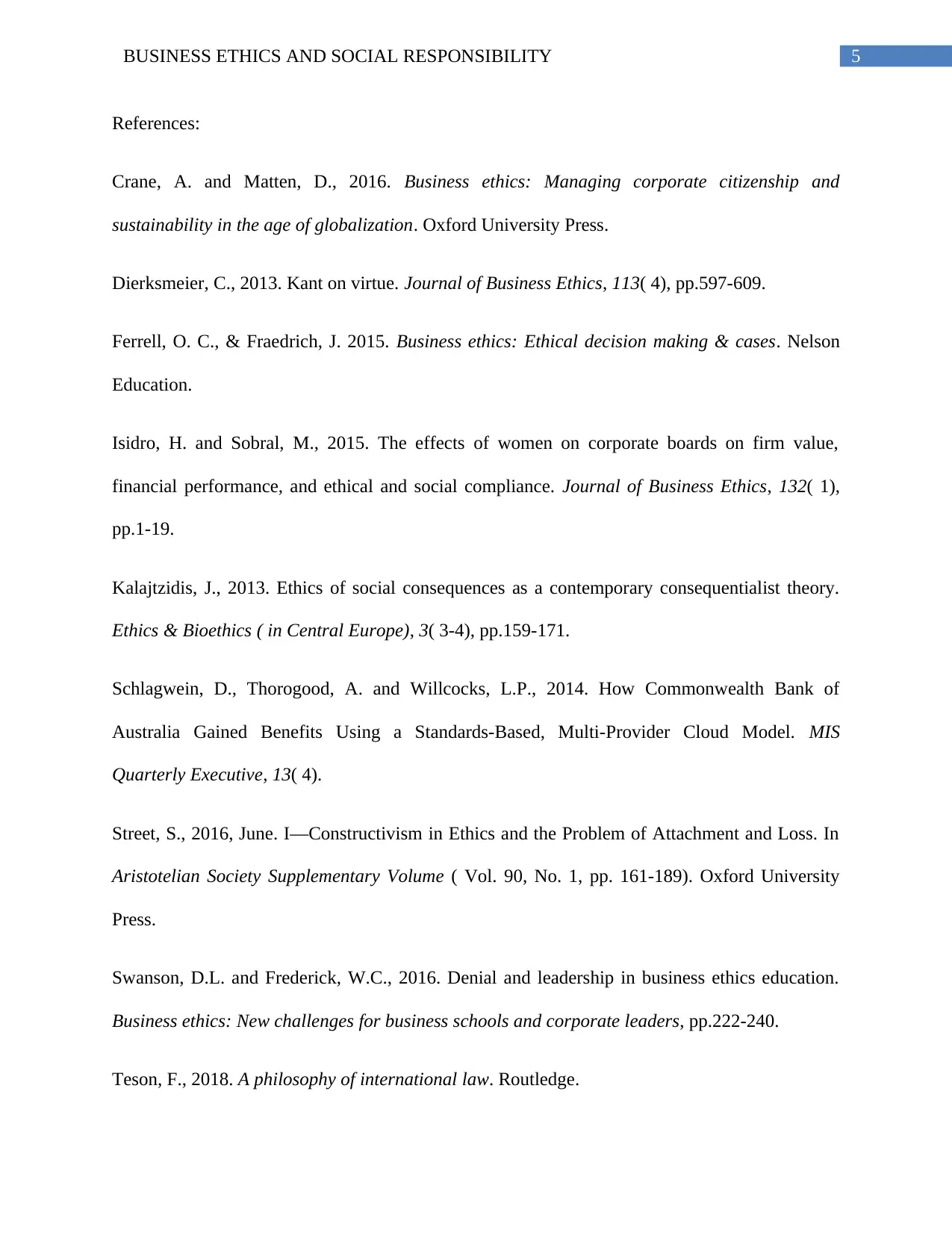
5BUSINESS ETHICS AND SOCIAL RESPONSIBILITY
References:
Crane, A. and Matten, D., 2016. Business ethics: Managing corporate citizenship and
sustainability in the age of globalization. Oxford University Press.
Dierksmeier, C., 2013. Kant on virtue. Journal of Business Ethics, 113( 4), pp.597-609.
Ferrell, O. C., & Fraedrich, J. 2015. Business ethics: Ethical decision making & cases. Nelson
Education.
Isidro, H. and Sobral, M., 2015. The effects of women on corporate boards on firm value,
financial performance, and ethical and social compliance. Journal of Business Ethics, 132( 1),
pp.1-19.
Kalajtzidis, J., 2013. Ethics of social consequences as a contemporary consequentialist theory.
Ethics & Bioethics ( in Central Europe), 3( 3-4), pp.159-171.
Schlagwein, D., Thorogood, A. and Willcocks, L.P., 2014. How Commonwealth Bank of
Australia Gained Benefits Using a Standards-Based, Multi-Provider Cloud Model. MIS
Quarterly Executive, 13( 4).
Street, S., 2016, June. I—Constructivism in Ethics and the Problem of Attachment and Loss. In
Aristotelian Society Supplementary Volume ( Vol. 90, No. 1, pp. 161-189). Oxford University
Press.
Swanson, D.L. and Frederick, W.C., 2016. Denial and leadership in business ethics education.
Business ethics: New challenges for business schools and corporate leaders, pp.222-240.
Teson, F., 2018. A philosophy of international law. Routledge.
References:
Crane, A. and Matten, D., 2016. Business ethics: Managing corporate citizenship and
sustainability in the age of globalization. Oxford University Press.
Dierksmeier, C., 2013. Kant on virtue. Journal of Business Ethics, 113( 4), pp.597-609.
Ferrell, O. C., & Fraedrich, J. 2015. Business ethics: Ethical decision making & cases. Nelson
Education.
Isidro, H. and Sobral, M., 2015. The effects of women on corporate boards on firm value,
financial performance, and ethical and social compliance. Journal of Business Ethics, 132( 1),
pp.1-19.
Kalajtzidis, J., 2013. Ethics of social consequences as a contemporary consequentialist theory.
Ethics & Bioethics ( in Central Europe), 3( 3-4), pp.159-171.
Schlagwein, D., Thorogood, A. and Willcocks, L.P., 2014. How Commonwealth Bank of
Australia Gained Benefits Using a Standards-Based, Multi-Provider Cloud Model. MIS
Quarterly Executive, 13( 4).
Street, S., 2016, June. I—Constructivism in Ethics and the Problem of Attachment and Loss. In
Aristotelian Society Supplementary Volume ( Vol. 90, No. 1, pp. 161-189). Oxford University
Press.
Swanson, D.L. and Frederick, W.C., 2016. Denial and leadership in business ethics education.
Business ethics: New challenges for business schools and corporate leaders, pp.222-240.
Teson, F., 2018. A philosophy of international law. Routledge.
⊘ This is a preview!⊘
Do you want full access?
Subscribe today to unlock all pages.

Trusted by 1+ million students worldwide
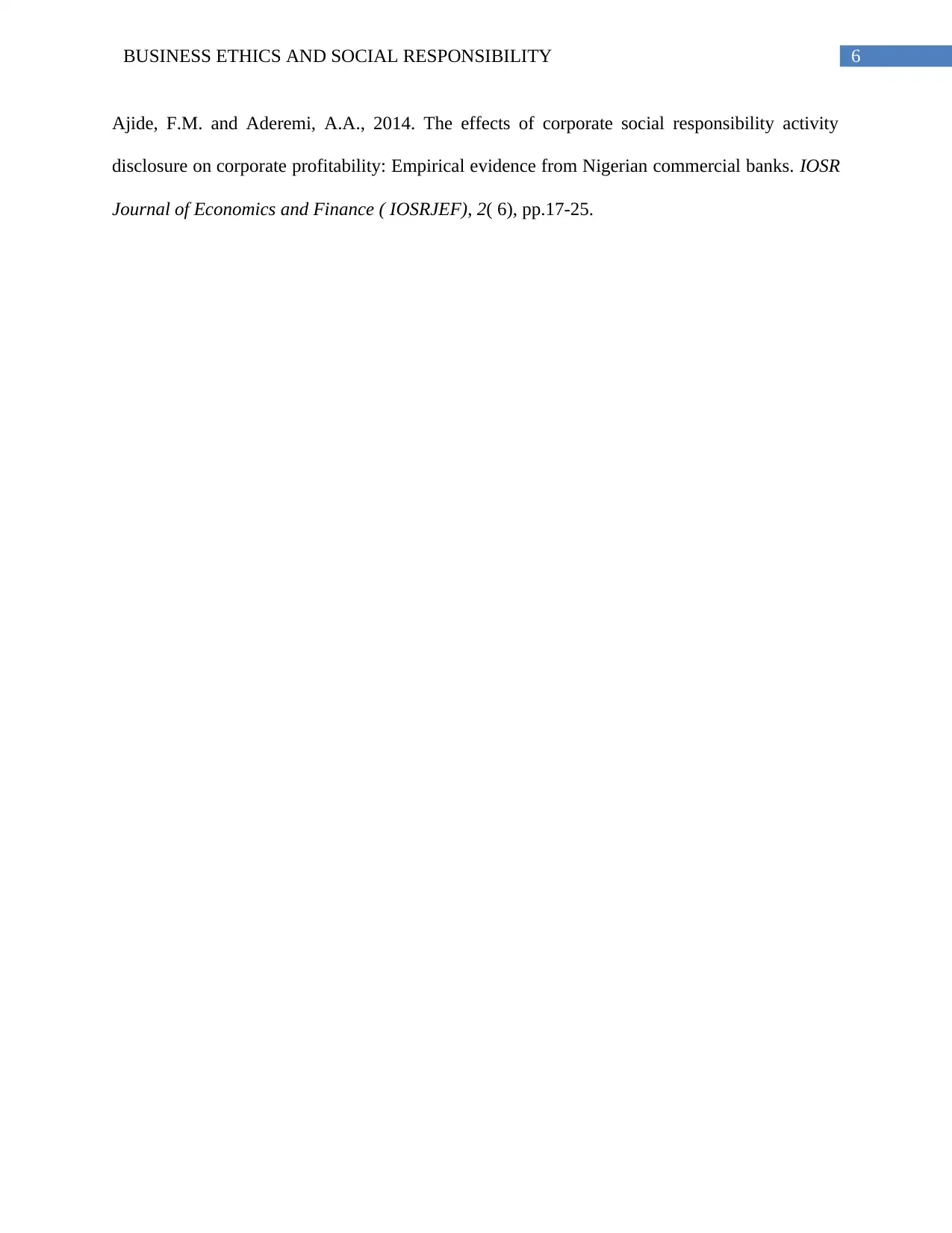
6BUSINESS ETHICS AND SOCIAL RESPONSIBILITY
Ajide, F.M. and Aderemi, A.A., 2014. The effects of corporate social responsibility activity
disclosure on corporate profitability: Empirical evidence from Nigerian commercial banks. IOSR
Journal of Economics and Finance ( IOSRJEF), 2( 6), pp.17-25.
Ajide, F.M. and Aderemi, A.A., 2014. The effects of corporate social responsibility activity
disclosure on corporate profitability: Empirical evidence from Nigerian commercial banks. IOSR
Journal of Economics and Finance ( IOSRJEF), 2( 6), pp.17-25.
1 out of 7
Related Documents
Your All-in-One AI-Powered Toolkit for Academic Success.
+13062052269
info@desklib.com
Available 24*7 on WhatsApp / Email
![[object Object]](/_next/static/media/star-bottom.7253800d.svg)
Unlock your academic potential
Copyright © 2020–2026 A2Z Services. All Rights Reserved. Developed and managed by ZUCOL.





